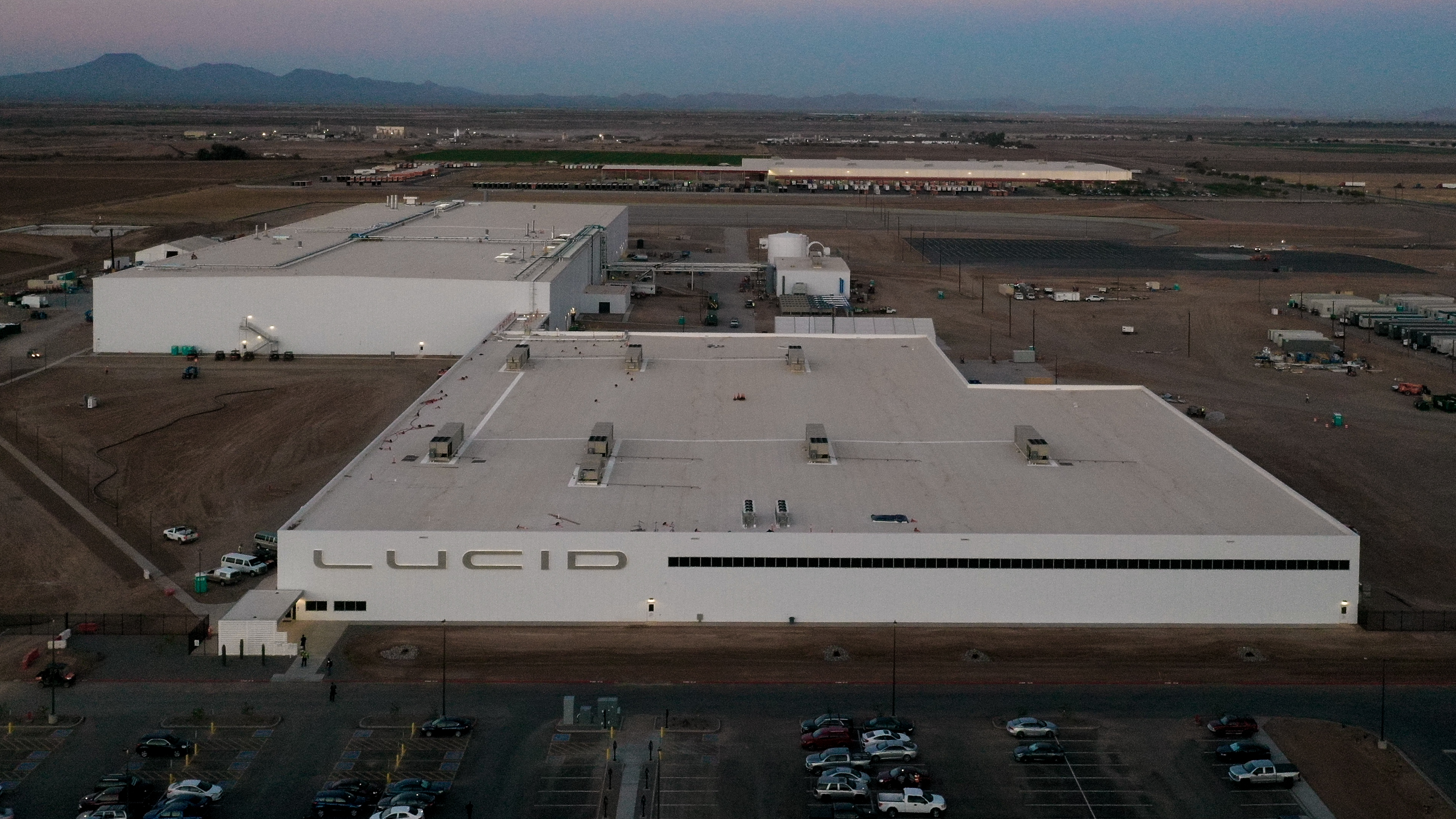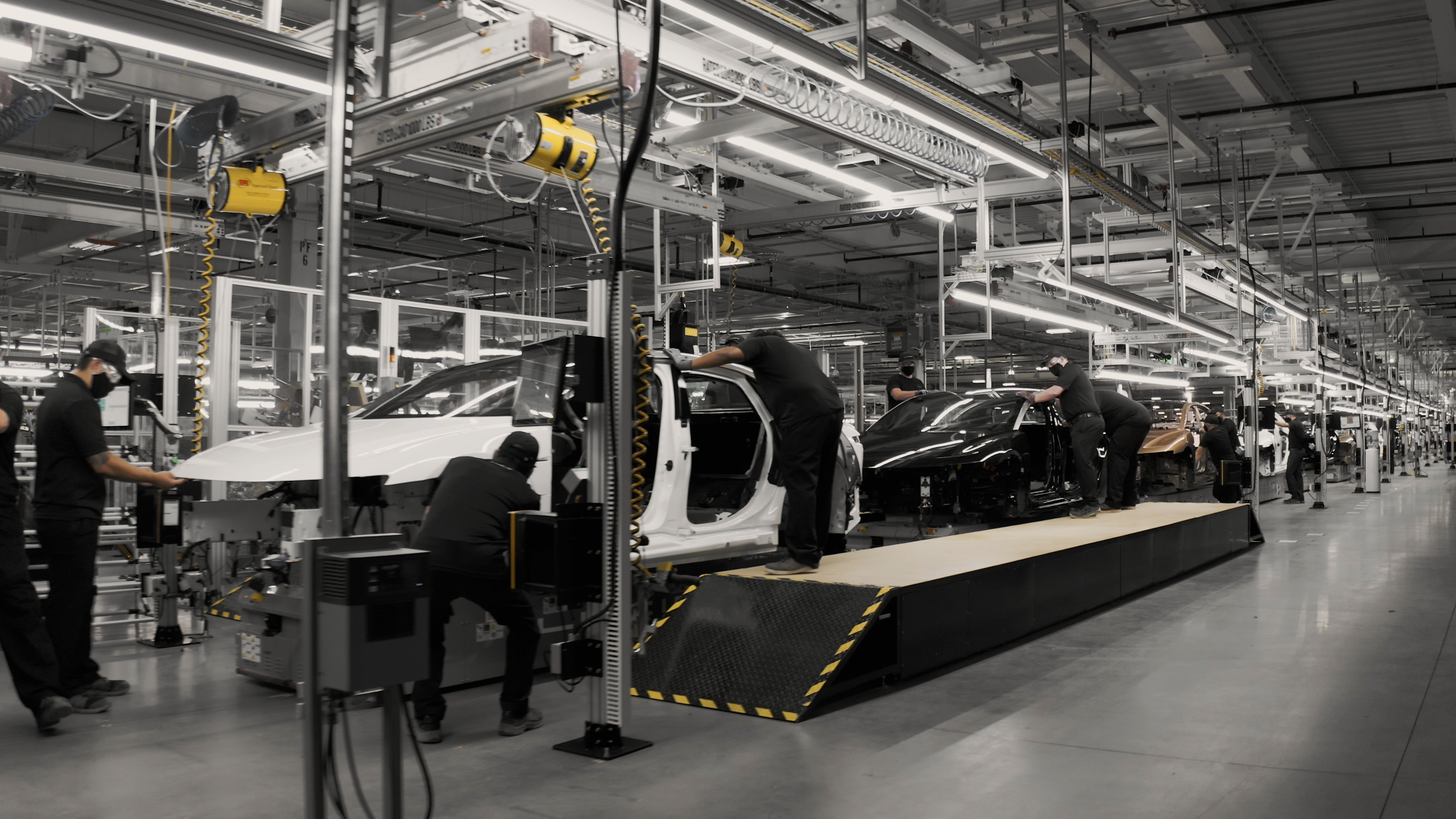Electric automaker Lucid Motors has completed the initial phase of its $700 million factory, a milestone required to begin production of its first luxury all-electric Air sedan this spring.
The factory, which is located about halfway between Tucson and Phoenix off Interstate 10, has the capacity to produce 30,000 vehicles a year. If Lucid, led by CEO Peter Rawlinson, is successful in its bid to attract buyers, that factory will expand from its current 999,000 square feet to more than 5 million square feet. Once fully built out, the factory will have the capacity to build 400,000 vehicles a year.
It’s an ambitious plan for a company that has yet to deliver a single vehicle. Yet, Rawlinson has remained bullish of EVs and Lucid’s future. Lucid is already getting ready to resume construction on the next phase of the factory early next year that will be used to produce its next vehicle, an all-electric SUV in 2023.
The company plans to build out the factory, which sits on 590 acres, over four phases through 2028.
The completion of the first phase comes about four years since Lucid Motors first announced its intentions to produce electric vehicles. It’s a milestone that almost didn’t happen. As the company burned through capital, it struggled to find new investors. Saudi Arabia’s sovereign wealth fund finally stepped up in September 2018 and committed to invest $1 billion into the company.
The all-electric luxury Air sedan, which was revealed in September, has a range of up to 517 miles, depending on the variant, and a design that puts technology and understated luxury front and center.
Two of the four variants — the $169,000 flagship Dream edition and a $139,000 Grand Touring model — will go into production first at its new factory this year. Deliveries of these variants are slated to begin in spring 2021. Two other variants, a Touring model priced at $95,000 and a base model that’s a smidge below $80,000, are expected at the end of 2021 and into 2022, respectively. (All prices are before the $7,500 federal tax credit is accounted for.)
The Air is meant to be the electric alternative to the Mercedes Benz S Class. That means performance matters as much the design. and it does come with some eye popping performance specs. For instance, the Dream edition boasts 1,080 horsepower and can travel from zero to 60 mph acceleration in 2.5 seconds. As a result of the power, the Dream edition has 465 miles of range. Meanwhile, the Grand Touring has 800 horsepower and can hit that same acceleration in 3 seconds, but has the highest range of 517 miles.
The Air will also be loaded with 32 sensors, a driver-monitoring system and an Ethernet-based architecture all for its advanced driver assistance system, which is designed to support hands-free driving on highways. Inside, a 34-inch curved glass 5K display sits in front of the driver, and appears to float above the dashboard. Another center touchscreen is retractable, revealing more storage. Meanwhile, a few physical controls remain on the steering wheel and just above the center screen to control volume and activate the ADAS and Amazon Alexa, which is integrated into the vehicle. Below that center touchscreen and moving to the console is a spot for inductive charging, cup holders and USB-C ports, along with additional storage.
To accomplish all of this, Lucid as touted its approach to design as well as its advanced manufacturing process. Lucid says is uses riveted and bonded monocoque body structure instead of spot welds. Most modern vehicles today have a unibody design, which means the frame, floor and chassis are made of a single structure. A monocoque design is typically seen in motorsports with the frame acting as a skin that gets its strength by distributing tension and compression.
"electric" - Google News
December 01, 2020 at 10:48PM
https://ift.tt/33x0cOV
Lucid Motors completes $700M factory to produce its first electric vehicles - TechCrunch
"electric" - Google News
https://ift.tt/2yk35WT
https://ift.tt/2YsSbsy
Bagikan Berita Ini
















0 Response to "Lucid Motors completes $700M factory to produce its first electric vehicles - TechCrunch"
Post a Comment